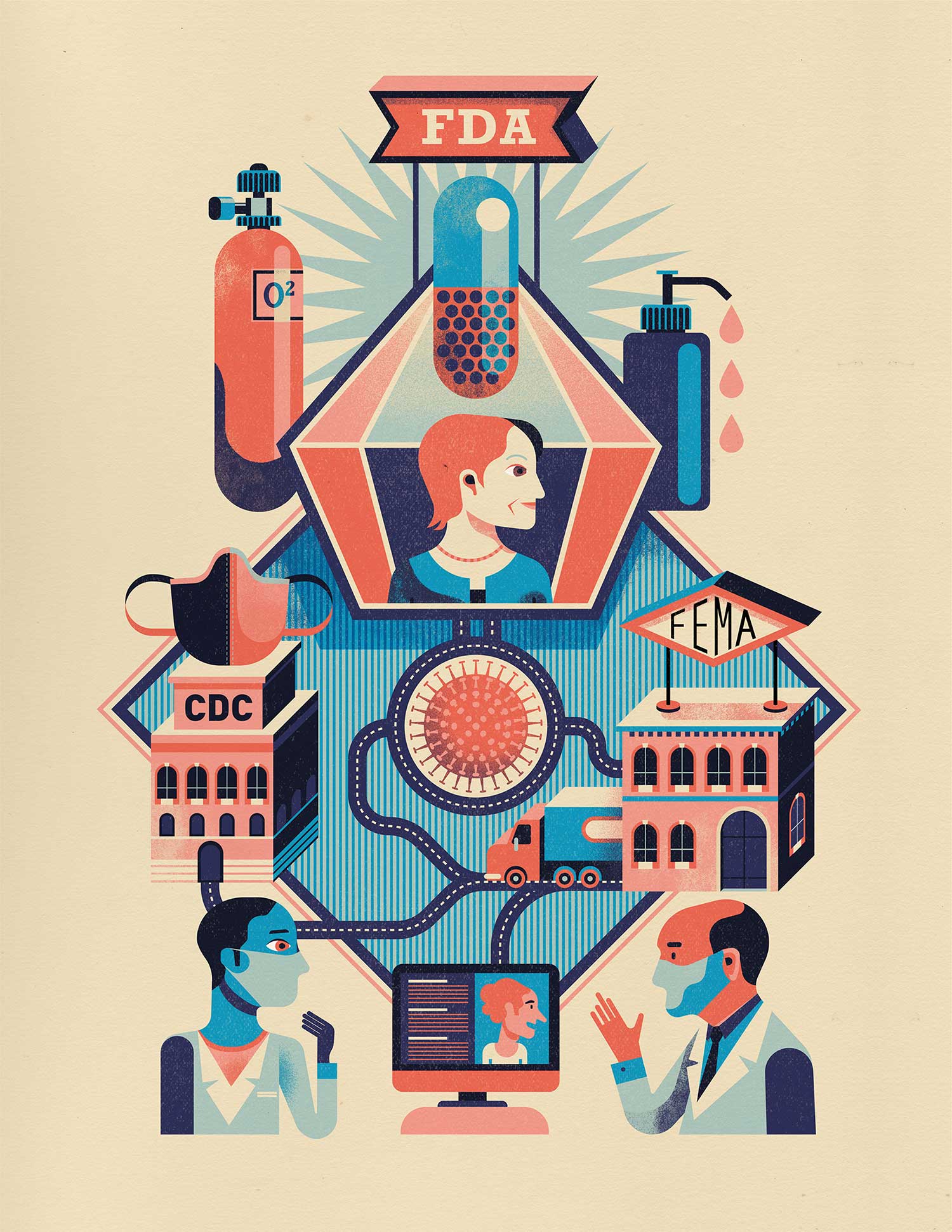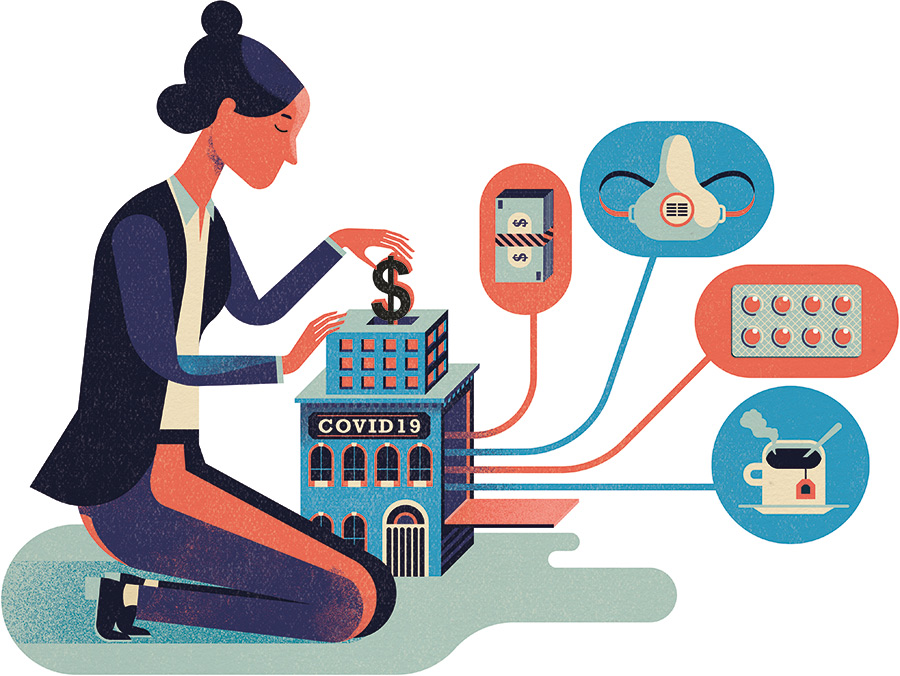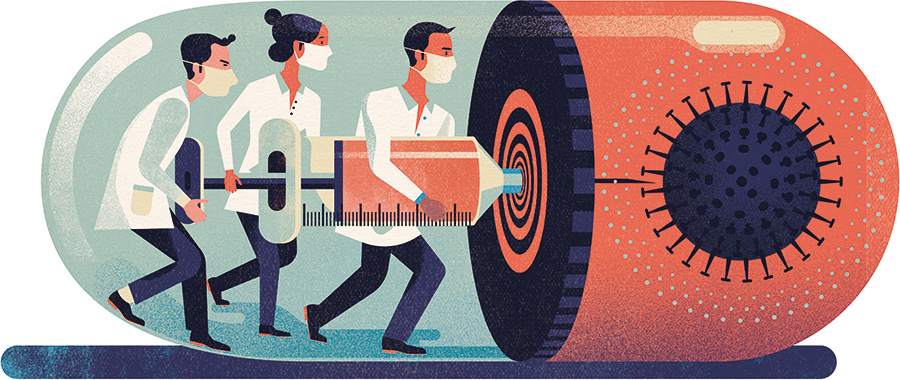
Still, safety comes before speed.
“We react very carefully, like most of the biomedical community, and point out that things aren’t proven until proven in clinical trials,” she adds. “A drug is always very promising until the first person is tested, and then reality begins to set in.”
Drugs aren’t the only critical supplies under her purview during the virus crisis. Her group regulates hand sanitizer as well as medical gases used in ventilators. By late April, 400 breweries or distilleries had applied for approval to produce sanitizer.
During her 34 years with the FDA, Woodcock says, “I’ve dealt with many crises, but this pandemic is the greatest magnitude for us, causing the most tremendous harm to people in this country and to the country economically.”
Six hundred miles south of Woodcock, two other Bucknellians are putting in extra hours to help mitigate that harm at the Centers for Disease Control. Bob Kirkcaldy ’95, a medical epidemiologist in the Division of STD Prevention, and Lauri Hicks ’95, director of the Office of Antibiotic Stewardship, found themselves working together this spring to medically clear CDC staff for deployment outside the Atlanta headquarters.
This is one of many roles both have played in helping the CDC manage the pandemic. “My focus has shifted from protecting the safety of the general public to protecting the safety of the federal workforce so that the response can be sustained,” says Hicks.
“The COVID-19 response has been among the most challenging work that I’ve done at CDC,” Kirkcaldy says. “The intensity and long hours hearkened back to medical residency. But it’s extremely gratifying to be able to bring all of my training and knowledge to bear and to work alongside amazing colleagues to combat a national public health threat.”
Hicks, who deployed and led teams during many past responses, including Ebola and Influenza H1N1, says this has been a challenge like no other. “The scope of this outbreak and the impact on our country is unprecedented. Just this past week my family lost a loved one due to COVID-19. For the first time in my career, my work on a response feels quite personal.”
Back up north, Kevin Stewart ’88 is helping the Federal Emergency Management Agency with the complicated logistics of moving essential equipment like ventilators, masks, gowns and gloves to the New England states. In late April, testing kits and swabs were among his hard-to-find items.
Initially, Stewart sourced items from the Strategic National Stockpile, but when it became depleted, he turned to contractors and vendors. Once items are located, FEMA coordinates shipments to state warehouses so states can make distributions.
Challenging as it’s been to work seven days a week for weeks on end, Stewart has found it gratifying that “a lot of businesses and a lot of people have stepped up to really help out, and we went from having very little supplies to a situation now where we have more and more stuff to fight this with. We set the battlefield very quickly after not having anything.”
Across the country in San Diego, Thomas Buchholz ’84 continues to fight his usual opponent — cancer — but with a slightly different playbook. Buchholz, a radiation oncologist and medical director of Scripps MD Anderson Cancer Center, is relying more on telemedicine for patient appointments. While patients still come to the cancer center for necessary treatments like surgery, radiation and chemotherapy, many of the clinic appointments can safely and more conveniently be performed with telehealth technologies.
The COVID-19 pandemic crisis has been particularly hard on cancer patients. Buchholz says, “Cancer patients naturally have significant stress when confronted with a cancer diagnosis. Many need to start treatments that can compromise their immune systems so the COVID-19 fears become even more acute. I have a tremendous degree of empathy for my patients and all those who are confronting this pandemic and cancer at the same time.” — Sherri Kimmel
“I was getting phone calls from first responders and police departments asking if we were making hand sanitizer even before the coronavirus really hit the states,” says Tim, who runs Claremont Distilled Spirits in Fairfield, N.J., with wife Janet Hall-Koether ’90. “Once it became obvious to us what was going on, we jumped right in.”
Since then, the couple, their five employees and two children — including Anna Koether ’22 — have worked ’round the clock. Using alcohol made from raw grain, the team has produced more than 30,000 bottles for the public and donated hundreds of gallons to first responders through New Jersey’s Office of Emergency Management.
The Koethers aren’t the only Bucknellians re-evisioning their businesses during these chaotic times. At Lost Ark Distilling Co. in Columbia, Md., Margaret Flood Barry ’84 and her team turned 10,000 bottles of donated wine into alcohol for hand sanitizer. The distillery — with about 20 workers, including the Barrys’ three children — produced more than 600 half-gallon bottles, which were donated to essential entities such as the Maryland State Dental Association and federal agencies at Fort Meade.
“Its a great feeling to know that I am involved in a business that can really serve the community in a time of need,” says Barry.
While some distilleries are tapping into a new market, suppliers like Keith Sansone ’12, sales and distribution director at Torch & Crown Brewing Co. in New York City, are finding other ways to serve — literally.
Right after New York State allowed alcohol manufacturers to sell directly to consumers, Sansone launched Torch & Crown’s beer delivery service in Manhattan — not only helping the startup brewery survive, but also giving people a taste of normalcy during isolation.
“We’ve seen a significant amount of support from consumers,” Sansone says. “I think the popularity of happy hours on video platforms like Zoom is a big reason why. It’s shown us that keeping something as simple as beer accessible is necessary and welcome in our community, especially now.” — Brooke Thames

This spring, many thousands of potato chips showed up at hospitals, police stations and fire departments across the country.
The delicious donations were how Pennsylvania- based Utz Quality Foods said thanks to the men and women putting their lives at risk during the COVID-19 outbreak.
“A big thank-you to Utz for bringing several boxes of snacks,” tweeted Paul Restivo of the Jacksonville, Fla., sheriff’s office, in one typical response. “Your generosity and kindness is much appreciated.”
Through funding to accelerate the development of COVID-19 treatments around the world, cash donations for people affected by the virus, and, yes, even deliveries of salty snacks, Bucknellians showed remarkable generosity during these dark times.
As the son-in-law of Mike and Jane Rice, Utz CEO Dylan Lissette P’21, P’23 is a fourth-generation member of the Utz family. Lissette and his wife, Stacie, have two sons at Bucknell, Alex ’21 and Caleb ’23.
In March, Dylan Lissette sent an email to his company’s 14 plants and 100 distribution centers, encouraging them to contact hospitals and first responders to see how they could help.
“It kind of took off on its own at the ground level,” Lissette says. “We figured it was an easy way to say thank you to those who are giving their time on the front lines.”
Snacks can help raise spirits — and so can cash. That’s why Charlotte-based LendingTree donated $1 million to the COVID-19 Response Fund, which helps people throughout the Queen City.
“It’s important we act now so that assistance is available when it’s needed most,” CEO Doug Lebda ’92 told Charlotte-based WBTV. “We all have an important role to play, and LendingTree is committed to helping our community during this unprecedented time of need.”
At the Bill & Melinda Gates Foundation in Seattle, CFO Carolyn Neely Ainslie ’80 and her colleagues launched the COVID-19 Therapeutics Accelerator, which puts $125 million behind the effort to identify treatments for the virus and distribute those drugs effectively.
“Philanthropy, and that includes the Gates Foundation, can take risks that governments can’t and corporations won’t, particularly in early-stage innovations and initiatives,” Ainslie says. “We can bring people and ideas together for the public good.”
As the crisis continues, Ainslie calls on her fellow Bucknellians to stay home, seek out reliable sources of information and keep hope alive.
“I encourage everyone to remain optimistic,” she says. “When we all work together, we can solve big problems.” — Bryan Wendell

But when Lori Lehman ’79, M’79 and her team at Gilead Sciences Inc. submitted the drug remdesivir as a possible treatment for COVID-19, the approval came back the next day.
“This is unheard of during my career,” says Lehman, who joined Gilead in 2004 and is now the company’s vice president of research strategy & portfolio management. “Drug discovery and development is often a long process.”
As doctors and nurses fight COVID-19 inside emergency rooms and intensive-care units, Lehman and other scientists work behind the scenes to develop a treatment that will lessen the intensity and duration of the virus.
Gilead’s COVID-19 journey began when Americans were still packing concert halls, movie theatres and NFL stadiums. In January, Lehman’s team recognized the risk of COVID-19 and started to develop a plan.
“All employees who were traveling from Asia were asked to quarantine at home, and we started scaling up remdesivir, in case it could be an antiviral tool to reduce the pandemic,” Lehman says. “All hands were on deck to improve and accelerate the process.”
Gilead donated the drug to China and the National Institutes of Health for clinical trials while beginning its own studies.
This isn’t the first time remdesivir has been eyed as an antiviral. Gilead created the drug to treat Ebola, and even though remdesivir was less effective at treating it than originally hoped, the trials established the drug’s safety record in humans.
That pedigree allowed remdesivir to catapult into Phase 3 trials. In late April, the FDA authorized remdesivir for emergency use in patients with severe COVID-19 after a trial showed the drug shortened the severity and duration of the virus.
While many obstacles still lie ahead, including the complexities of potentially producing enough remdesivir for millions of people, Lehman is proud of her team’s work so far.
“I chose a career in the pharmaceutical industry because I wanted to apply my training on important unmet medical needs,” she says. “I am a small part of a huge team that has made a big difference in patients’ lives.”
Meanwhile in New Jersey, Valerie Ceva ’81 and her team at BioAegis Therapeutics Inc. are working to prove that the company’s primary product, a treatment for pneumonia sufferers called recombinant human plasma gelsolin therapy, could be effective for COVID-19 patients.
“The faster we can get it to market, the more lives we can save,” she says. “We had been preparing for our expanded studies in the fall, but when COVID-19 occurred, we expedited and redirected activities to this health crisis.”
The drug works by regulating inflammation in the lungs. Ceva says the therapy could increase the survival rate in COVID-19 patients while the world awaits a vaccine.
As trials ramp up at biotech companies such as Gilead and BioAegis, another Bucknellian provides the software that helps companies keep track of research.
Mitch Blumenfeld ’91 is the chief financial officer of Signant Health, which as of press time was working with 14 companies across 21 different COVID-19 trials. Signant manages the trials’ supply chains and provides clinical data to biotech companies.
“We are supporting studies for both treatments and vaccines,” he says. “Our products help the speed and efficiency of these trials so investigational medicines can move quickly.” — Bryan Wendell
